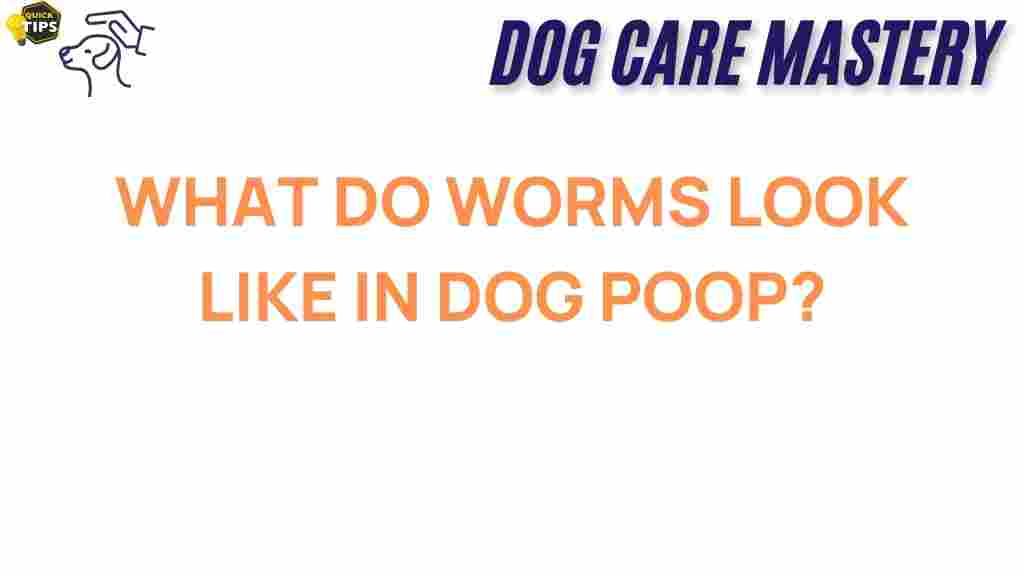Worms in Dog Poop: What You Need to Know
As a dog owner, discovering worms in your dog’s poop can be alarming. It raises questions about your pet’s health, hygiene, and potential risks to other pets and even humans. Understanding what these worms signify and how to address the issue is essential for maintaining your dog’s well-being. In this comprehensive guide, we will unravel the mystery surrounding worms in dog poop, what they reveal about your dog’s health, and the steps you can take to manage this situation effectively.
Types of Worms Found in Dog Poop
Worms in dog poop can vary in type and size, and each type can indicate different health concerns. Here are the most common types of worms you might encounter:
- Roundworms: These are the most common intestinal parasites in dogs. They can be long and spaghetti-like and are often visible in the feces. Roundworms can be contracted through contaminated soil, feces, or by ingesting infected rodents.
- Hookworms: These are smaller, but they can cause significant harm. Hookworms latch onto the intestinal walls and feed on your dog’s blood, potentially leading to anemia.
- Tapeworms: Tapeworms appear as flat, white segments that may look like grains of rice in your dog’s poop. They are often caused by ingesting fleas or rodents.
- Whipworms: These are less common but can still affect dogs. They are thin and whip-like and can lead to diarrhea and weight loss.
- Heartworms: While heartworms are not found in feces, they are a serious concern for dogs. They are transmitted through mosquito bites and can lead to serious health issues if left untreated.
What Do Worms in Dog Poop Reveal?
Finding worms in your dog’s stool can indicate several underlying health issues. Here’s what these parasites may reveal:
- Intestinal Infection: Worms often indicate an intestinal infection, suggesting that your dog’s digestive system is compromised.
- Poor Nutrition: Infestations can lead to malnutrition, as worms can consume nutrients meant for your dog.
- Hygiene Issues: The presence of worms may suggest that your dog’s living environment is not adequately sanitized, increasing the risk of reinfection.
- Exposure to Other Animals: If your dog has been in contact with other animals, especially if they are stray or unwell, they may have contracted worms.
Signs Your Dog May Have Worms
Aside from seeing worms in dog poop, there are other signs that may indicate your dog is dealing with a worm infestation:
- Vomiting or diarrhea
- Weight loss despite a good appetite
- Bloated abdomen
- Visible worms in vomit or feces
- Poor coat condition
- Increased appetite
Step-by-Step Process: What to Do When You Find Worms in Dog Poop
If you discover worms in your dog’s poop, follow these steps to address the issue:
Step 1: Identify the Worms
While it might be challenging to identify the exact type of worm without a vet’s assistance, try to take note of the appearance of the worms. This information can be crucial for your veterinarian.
Step 2: Consult Your Veterinarian
It’s essential to consult your veterinarian as soon as possible. They will conduct a thorough examination and may recommend a fecal test to identify the type of worm and the appropriate treatment.
Step 3: Administer Treatment
Once the type of worm is identified, your veterinarian will prescribe the necessary medication. Treatment can vary depending on the type of worm:
- Roundworms: Typically treated with dewormers such as pyrantel pamoate or fenbendazole.
- Hookworms: Treatment often includes medications like fenbendazole or milbemycin oxime.
- Tapeworms: Praziquantel is commonly used to eliminate tapeworms.
- Whipworms: Fenbendazole or milbemycin oxime may be prescribed.
Step 4: Maintain Hygiene
After treating your dog, it’s crucial to maintain a clean environment to prevent reinfestation:
- Regularly clean up your dog’s waste.
- Wash your dog’s bedding and toys frequently.
- Avoid letting your dog eat feces (coprophagia).
- Keep your dog’s living area sanitized.
Troubleshooting Tips for Preventing Worm Infestations
Preventing worms in dog poop starts with proactive measures. Here are some troubleshooting tips to help keep your dog worm-free:
Regular Veterinary Check-ups
Routine check-ups with your veterinarian can help catch any potential infestations early. Regular fecal tests can ensure your dog is free from parasites.
Preventative Medications
Ask your veterinarian about preventative medications that can help protect your dog from worms. Monthly heartworm prevention is particularly important.
Keep Your Dog Away from Contaminated Areas
Limit your dog’s exposure to areas where they may come into contact with infected feces or rodents, such as parks or areas frequented by stray animals.
Maintain a Healthy Diet
A balanced diet can boost your dog’s immune system, making it less susceptible to infections. Consult your vet about the best diet for your dog’s specific needs.
Flea Control
Since fleas can carry tapeworms, effective flea control is crucial. Use vet-recommended flea treatments to keep your dog protected.
Conclusion
Worms in dog poop can be concerning, but understanding what they mean and how to address the issue can alleviate your worries. Regular veterinary care, good hygiene practices, and preventative measures can help keep your precious pup free from worms. If you notice any signs of worms or other health concerns, don’t hesitate to consult your veterinarian. For more information on dog health, check out this helpful resource. Remember, your vigilance plays a vital role in ensuring your dog’s health and happiness.
Understanding and addressing worms in dog poop is crucial for your dog’s health and well-being. By taking the necessary precautions and maintaining a proactive approach, you can keep your furry friend safe and healthy.
This article is in the category Health and created by dogcaremastery Team
